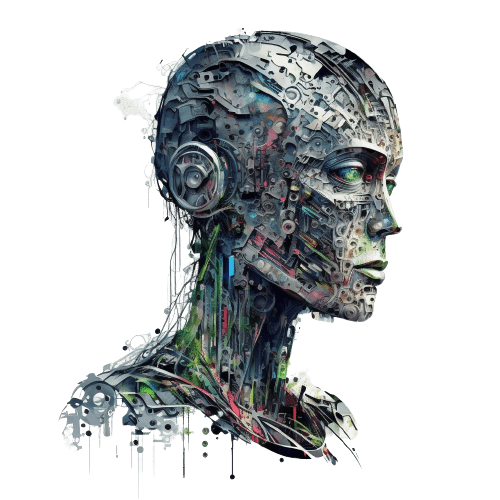In the realm of transformative technologies, artificial intelligence (AI) stands out as a revolutionary force altering the face of various industries. The dynamic relationship between AI and the job market presents a complex web of opportunities and challenges that are reshaping our understanding of work. This article delves into the impact of AI on jobs, exploring its diverse implications across sectors, the importance of successful AI integration and upskilling opportunities, and the ways to prepare the workforce for AI integration. Simultaneously, it addresses the ethical concerns and potential negative consequences arising from this groundbreaking technology. By examining both the threats and opportunities AI presents, we aim to provide a comprehensive understanding of how AI is reshaping the job market and how businesses and individuals can navigate this changing landscape.
Key Takeaway:
- AI’s impact across industries: Artificial intelligence has the potential to revolutionize industries by automating repetitive tasks, enhancing productivity, and enabling innovation. From healthcare to finance to transportation, AI is already transforming the way businesses operate.
- Successful AI integration and upskilling opportunities: To fully harness the benefits of AI, organizations must focus on successful integration by investing in upskilling their workforce. By providing training and resources, employees can adapt to new roles and collaborate with AI systems, leading to improved efficiency and job satisfaction.
- Preparing the workforce for AI integration: As AI technology advances, it is crucial to prepare the workforce for the integration of AI. This includes fostering a culture of continuous learning, promoting creativity and critical thinking, and developing adaptability skills. This will ensure that individuals can thrive in an AI-driven job market.
- Ethical concerns and potential negative consequences: While AI offers numerous opportunities, there are also ethical concerns and potential negative consequences to consider. This includes issues related to privacy, bias, and job displacement. It is important for organizations and policymakers to address these concerns and implement regulations to mitigate any adverse effects of AI on the job market.
AI’s impact across industries
AI’s Transformational Influence on Diverse Sectors
The proliferation of artificial intelligence has brought about a paradigm shift in various industries. The profound impact of AI across sectors has revolutionized workflows and business models, resulting in unprecedented opportunities for growth and innovation. By harnessing the power of AI, industries are experiencing unparalleled advancements, enabling them to enhance efficiency, make data-driven decisions, optimize processes, and deliver personalized solutions.
AI’s infiltration into industries like healthcare, finance, manufacturing, and retail has paved the way for remarkable breakthroughs, improving productivity, customer experiences, and overall business performance.
Furthermore, AI’s impact extends beyond operational enhancements. In healthcare, for instance, AI-driven technologies leverage massive patient data to facilitate accurate diagnoses, early disease detection, and precision medicine. In the financial sector, AI-powered algorithms revolutionize fraud detection, risk assessment, and provide personalized financial services. Manufacturing industries benefit from AI’s optimization capabilities, reducing costs, improving quality control, and increasing production efficiency. Retail sectors leverage AI to analyze consumer behavior, enhance personalized recommendations, and optimize inventory management. The limitless possibilities presented by AI are empowering industries to adapt and evolve, maximizing their potential for success in an increasingly competitive landscape.
Moreover, it is crucial to acknowledge that AI’s disruption has not been without challenges. As industries increasingly rely on automation and intelligent systems, concerns about job security and displacement arise. However, history has shown that while technology may eliminate certain jobs, it also creates new opportunities and job categories that were previously unimaginable. Collaborative efforts between humans and AI have proven to be most effective, with AI augmenting human capabilities instead of replacing them entirely. This transformative partnership between humans and AI has led to the emergence of new roles, such as AI trainers, data scientists, and AI ethicists. The key lies in embracing AI as a complement to human expertise and leveraging its capabilities to unlock unprecedented potential.
One example of AI’s impact is evident in the manufacturing industry. In a factory setting, AI-powered robotic assistants work alongside human workers, seamlessly performing repetitive tasks, enhancing productivity, and reducing the risk of human error. This collaboration has not only improved efficiency but also created opportunities for workers to upskill and transition to more complex, cognitive roles. Workers who were previously engaged in mundane tasks can now focus on critical thinking, problem-solving, and creative aspects of their work, leading to a more fulfilling and engaging work environment.
Successful AI integration and upskilling opportunities
Successful AI integration and upskilling opportunities have had a profound impact on the job market. With the implementation of AI technologies, organizations can optimize their processes and improve efficiency. Moreover, individuals can enhance their skill sets and adapt to the changing job requirements. This integration has paved the way for new job roles and career paths.
Companies that successfully integrate AI and provide upskilling opportunities to their employees can harness the full potential of these technologies and gain a competitive edge in the market.
Pro Tip: Embracing AI and investing in upskilling will enable organizations and individuals to thrive in the evolving job landscape.
Preparing the workforce for AI integration
Advancing Workforce Readiness for AI Integration
As AI continues to permeate various industries, it becomes imperative to equip the workforce with the necessary skills to seamlessly integrate this technology. Organizations must proactively prepare employees for AI integration to capitalize on its potential benefits and mitigate potential threats. By developing targeted training programs and fostering a culture of adaptability, companies can empower their workforce to embrace AI as a tool for augmenting job roles and enhancing overall productivity.
To successfully prepare the workforce for AI integration, organizations need to prioritize upskilling and reskilling initiatives. By identifying the specific AI-related skills required within each job function, companies can design training programs that address these needs. Investing in comprehensive AI education will enable employees to understand the intricacies of the technology, including its limitations, capabilities, and ethical implications. Additionally, fostering a growth mindset and promoting continuous learning opportunities will help individuals adapt to new AI-driven workflows and tasks.
Furthermore, companies should actively foster collaboration between humans and AI systems. By emphasizing the complementary nature of AI and human intelligence, organizations can create a harmonious work environment where employees understand how to leverage AI to enhance their own capabilities. Encouraging cross-functional collaboration and providing platforms for employees to share AI-related knowledge and best practices will facilitate effective integration across the entire workforce.
To ensure effective integration, organizations can establish clear channels for feedback and communication. By actively soliciting input from employees regarding their experiences with AI integration, organizations can identify potential roadblocks and make necessary adjustments. Regular communication can help address any concerns or fears related to job displacement and instead emphasize the potential for AI to augment existing roles and create new opportunities. This transparent approach will foster trust and engagement among employees, enabling a smoother transition to an AI-driven workplace.
Ethical concerns and potential negative consequences
Artificial Intelligence (AI) brings forth a range of ethical concerns and potential negative consequences. Here, we discuss these implications in more detail.
- Privacy concerns: With the increasing use of AI, there is a growing risk of privacy breaches, as AI systems often require access to large amounts of personal data. This raises concerns about the security and confidentiality of individuals’ information.
- Automation and job displacement: As AI rapidly advances, there is a fear that it may lead to job displacement and unemployment. AI-powered automation could replace certain job roles, leaving many individuals without employment opportunities.
- Algorithmic bias: One of the challenges associated with AI is the potential for bias in algorithms. If the training data used to develop AI systems is biased, it can result in discriminatory outcomes, further exacerbating existing societal inequalities.
- Lack of human control: Another concern about AI is the potential loss of human control. As AI systems become more sophisticated, there is a risk that they may exceed human comprehension and decision-making abilities, leading to autonomous actions with unforeseen consequences.
- Ethics of AI decision-making: AI systems are often designed to make autonomous decisions, leading to questions about the transparency and accountability of these decisions. What ethical considerations inform AI algorithms, and who should be responsible for the consequences of AI decision-making?
Furthermore, it is essential to establish regulatory frameworks and ethical guidelines to address these concerns and mitigate potential negative consequences. Such measures would ensure that AI is developed and implemented in a responsible and ethical manner, safeguarding against the misuse or unintended harm caused by AI systems.
Pro Tip: To address ethical concerns and potential negative consequences, organizations should prioritize transparency, accountability, and diversity in AI development, ensuring that the benefits of AI are shared in an inclusive and equitable manner.
Five Facts About The Impact of AI on Job Market: Threat or Opportunity?
- ✅ By 2025, the World Economic Forum predicts that 85 million jobs may be lost to automation and technology, while 97 million new roles will be created. (Source: World Economic Forum)
- ✅ Middle managers, salespeople, and accountants may be at risk of job displacement when AI is incorporated into their roles. (Source: Shelly Palmer, Syracuse University)
- ✅ AI has replaced low-level writing jobs, but has also led to the emergence of new roles like ‘prompt engineers’. (Source: Team Research)
- ✅ The automobile industry will see automation displace some workers, but it will also create jobs related to the development and maintenance of automated systems. (Source: Team Research)
- ✅ AI integration in the workplace raises ethical concerns, such as AI bias, which perpetuates or amplifies biases in historical data. (Source: Team Research)
FAQs about The Impact Of Ai On Job Market: Threat Or Opportunity?
What is the predicted impact of AI on the job market?
By 2025, the World Economic Forum estimates that 85 million jobs may be lost to automation and technology, while creating 97 million new roles.
Which professionals are at risk of being “doomed” due to AI incorporation?
Professionals like middle managers, salespeople, and accountants could be at risk of losing their jobs when AI is incorporated into their roles.
What are the concerns regarding AI’s impact on creative roles?
There are concerns that AI may replace creative roles such as music composition and art creation, potentially reducing opportunities for creatives.
What are some examples of successful AI integration in the workplace?
Examples include Microsoft’s Copilot, an AI-powered code assistant, and the use of AI to improve efficiency in customer service by increasing chat handling per hour.
How can the workforce be prepared for AI integration?
Government initiatives and programs focused on AI education and training, as well as clear expectations, informing employees about AI usage, and regularly evaluating AI effectiveness, can help prepare the workforce for AI integration.
What ethical concerns arise from AI integration in the workplace?
AI bias is a significant ethical concern, as algorithms can perpetuate biases and lead to unequal treatment. Measures to address this include ensuring fairness, transparency, and auditing algorithms to rectify biases.


